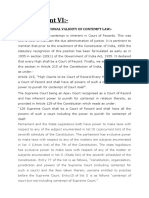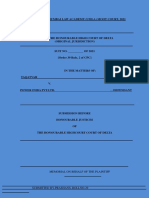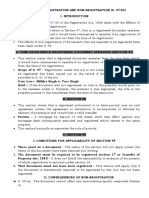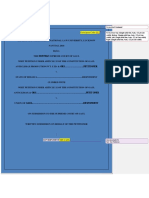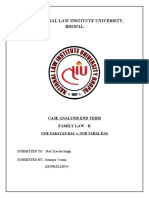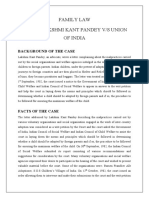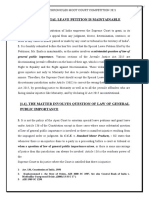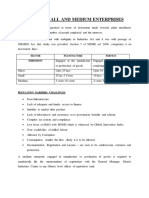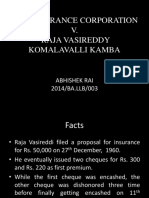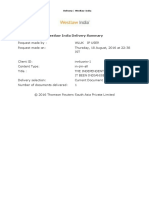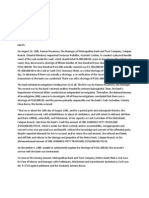SCILvMBPL CaseAnalysis
Uploaded by
Abhishek RaiCopyright:
Available Formats
SCILvMBPL CaseAnalysis
Uploaded by
Abhishek RaiOriginal Description:
Original Title
Copyright
Available Formats
Share this document
Did you find this document useful?
Is this content inappropriate?
Copyright:
Available Formats
SCILvMBPL CaseAnalysis
Uploaded by
Abhishek RaiCopyright:
Available Formats
CASE ANALYSIS
SUPER CASSETTES INDUSTRIES LTD V. MUSIC BROADCAST PRIVATE LIMITED
(AIR 2012 SC 2144)
CASE ANALYSIS
SUPER CASSETTES INDUSTRIES LTD V. MUSIC BROADCAST PRIVATE LIMITED
I. FACT OF THE CASE
On 16th May 2008, compulsory license for the work administered by Phonographic
Performance Ltd. (Hereinafter referred to as PPL) was granted in a dispute to which Super
Cassettes Industries Ltd (Hereinafter referred to as SCIL) was not a party. Subsequently, on
25th August 2010, Copyright Board fixed the rate for which compulsory license was to be
granted not just for PPL but for SCIL as well.
Thereafter, Music Broadcast Pvt. Ltd. (Hereinafter referred to MBPL) despite having a
voluntary license from SCIL wrote to them and informed it about broadcasting its work on
terms fixed by copyright board. SCIL questioned the validity of the order passed by the
Copyright board, to which Delhi High Court passed an order against MBPL from relying
upon the order of Copyright board.
Nonetheless, MBPL filed an application for compulsory license1 and on 28th March 2011, the
Copyright board dismissed the application for interim relief filed by MBPL on the ground
that it is not vested with such power. Subsequently, on an appeal filed by MBPL, Delhi High
Court via its order dated 1st September 2011, reversed the earlier ruling and held that the
Copyright Board has the power to issue interim compulsory license. Hence, SCIL preferred
an appeal against the order dated 1st September 2011 by the Delhi High Court.
II. ISSUES INVOLVED
Whether the Copyright Board, exercising the jurisdiction under Section 31 of the Copyright
Act, can grant Ad hoc compulsory licence by an interim order pending the adjudication of the
issue in works withheld from public?
III. ARGUMENTS FROM THE PLAINTIFF
Mr. Amit Sibal appeared for SCIL in the instant case wherein he averred that:
1. High Court had erred in law in holding that even in absence of an express conferment
by statute , the Copyright Board had the power to grant an interim compulsory license
under 31 of Copyright Act.
2. While 12 of the Copyright Act vested the Copyright Board with the authority to
regulate its own procedure and 74 conferred certain limited powers of a civil court
on the Board, the same were procedural in nature and did not vest the Board with a
1
31(b), Copyright Act, 1957.
NATIONAL LAW UNIVERSITY ODISHA 1|Page
CASE ANALYSIS
SUPER CASSETTES INDUSTRIES LTD V. MUSIC BROADCAST PRIVATE LIMITED
substantive right to grant interim orders under 31 of the Copyright Act.
3. Being a creature of statute, the Copyright Board could only exercise such powers as
were expressly vested in it by the statute. Thus, Copyright Board is a tribunal created
under 11 of Copyright Act2 and hence, could not exercise the substantive power of
granting an interim compulsory license.3
4. Notwithstanding the fact that the Copyright Board was discharging quasi-judicial
functions, it did not possess inherent powers to pass interim orders, since it continued
to be a tribunal governed by the statute under which it had been created.4
5. Final relief ought not to be granted at an interim stage.5
6. The courts will not imply a power in a particular provision of the statute if the
legislative intent behind the statute suggested a contrary view. Similarly, implying a
power to grant an interim compulsory license under 31 of the Copyright Act was not
the legislative intent since implying such a power would transform compulsory
licensing to statutory licensing without any statutory mandate to do so.
IV. ARGUMENT FROM THE DEFENDANT
Dr. Abhishek Singhvi appeared for MBPL wherein he averred that:
1. Although 31 of the Copyright Act may not have expressly vested the power to pass
interim orders on the Copyright Board pending disposal of an application for grant of
a compulsory licence, the same would have to be read into it as being incidental to the
powers granted by the Statute to the Board to grant compulsory licences.
2. It could not have been the intention of the legislature that pending the determination
of the right of an applicant to a compulsory licence, the public should be deprived of
the entertainment of listening to music in respect of which the owner has the
copyright.
3. The Copyright Board is vested with incidental and ancillary powers under 31 of the
Copyright Act to give effect to the final relief which it is empowered to give.
4. 12(7) states that the Copyright Board is deemed to be a Civil Court for certain
purposes and further, 12 is to be read in light of the Copyright Board being
2
11, Copyright Act, 1957.
3
See Rajeev Hitendra Pathak and Ors. v. Achyut Kashinath Karekar and Anr., 2011 (9) SCALE 287; Morgan
Stanley Mutual Fund v. Kartick Das, (1994) 4 SCC 225; Sham Lal v. State Election Commission, AIR 1997
P&H 164; Lingamma v. State of Karnataka, AIR 1982 Kar 18.
4
See B Prasad Singh v. Kali Singh, (1977) 1 SCC 57; Transcore v. Union of India, (2008) 1 SCC 125.
5
Morgan Stanley Mutual Fund v. Kartick Das, (1994) 4 SCC 225
NATIONAL LAW UNIVERSITY ODISHA 2|Page
CASE ANALYSIS
SUPER CASSETTES INDUSTRIES LTD V. MUSIC BROADCAST PRIVATE LIMITED
considered a quasi-judicial body discharging a quasi-judicial function having the
power to decide the reasonableness of royalties claimed by the copyright owner.
5. 19-A indicates that the Copyright Board was an adjudicating authority with respect
to disputes between the parties and would, therefore, be deemed to be vested with
ancillary powers to make interim orders in aid of the final relief that could be granted
Under 31 of the Copyright Act.
6. Power to pass certain interim orders were incidental and ancillary to the exercise of
powers conferred on a Tribunal by the Statute.6 Thus, the doctrine of implied power
would apply in the instant case as well and the High Court was therefore not at fault
while passing the orders dated 1st September 2011.
Mr Bhaskar P. Gupta, Mrs. Pratibha Singh and Mr. Harish Salve, appeared for the
Interveners, wherein they adopted Dr. Singhvi arguments and further, averred that:
7. The Copyright Board has the trappings of a quasi-judicial authority which inheres in it
the right to pass interim orders in the interest of the parties while keeping in mind
public interest and the principles of natural justice.
8. Unless the power to grant interim orders were read into 31 of the Copyright Act,
there would be a complete stalemate with respect to cases where matters were
pending before the Copyright Board thereby, resulting in the public being deprived of
such work.
9. The essence of the Copyright Act is the delicate balance between intellectual property
rights and the rights of access to the copyright material and a private right of
copyright would have to give way to the public interest as contemplated in 31 of the
Copyright Act.
V. JUDGEMENT
ALTAMAS KABIR, J.
1. 31 of the Copyright Act contemplate a final order after a hearing and after holding
an inquiry to see whether the ground for withholding of the work from the public was
justified or not. There is no hint of any power having been given to the Copyright
Board to make interim arrangements, such as, grant of interim compulsory licences,
6
Income Tax Officer v. M.K. Mohammed Kunhi, (1969) 2 SCR 65; Allahabad Bank, Calcutta v. Radha Krishna
Maity and Ors., (1999) 6 SCC 755; Industrial Credit and Investment Corporation of India Ltd. v. Grapco
Industries Ltd. and Ors., (1999) 4 SCC 710
NATIONAL LAW UNIVERSITY ODISHA 3|Page
CASE ANALYSIS
SUPER CASSETTES INDUSTRIES LTD V. MUSIC BROADCAST PRIVATE LIMITED
during the pendency of a final decision of an application.
2. Tribunals discharging quasi-judicial functions and having the trappings of a Court, are
generally considered to be vested with incidental and ancillary powers to discharge
their functions, but that does not imply that such Tribunal would have the power to
grant at the interim stage the final relief which it could grant.
3. If the legislature had intended that the Copyright Board should have powers to grant
mandatory injunction at the interim stage, it would have vested the Board with such
authority.
4. If the legislature had intended that the Copyright Board should have powers to grant
mandatory injunction at the interim stage, it would have vested the Board with such
authority.
JASTI CHELAMESHWAR, J.
1. Both the Courts and the Tribunals are adjudicatory bodies to whom the Legislature
entrusts the authority to resolve the disputes falling within the jurisdiction conferred
upon each of such bodies and brought before them. Further, the jurisdiction and
authority of not only the Tribunals, but also the Courts are structured by the statutory
grants and limitations.
2. The grant as well as the limitations on the tribunal and court could be either express or
implied which in turn can be inferred from the scheme of a particular enactment. The
considerations relevant for ascertaining whether there is an implied grant of such
powers appears to be:
a. Need to preserve status quo with respect to the subject matter of the dispute in
order to enable the party, which eventually succeeds in the litigation, to enjoy
the fruits of the success; and
b. Need to preserve the parties themselves a consideration.
3. By conceding a power to grant ad hoc compulsory licence during the pendency of the
proceeding would render the final inquiry into the question a futile exercise
4. Unless, it is demonstrated that failure to imply such power to direct immediate
republication or performance of a work in public would be detrimental to public
interest, the power to grant ad hoc compulsory licence, cannot be implied.
Thus, the Court held that in the absence of an express statutory grant, the power to grant an
ad hoc compulsory licence by way of interim order by the Copyright Board wont be implied.
NATIONAL LAW UNIVERSITY ODISHA 4|Page
You might also like
- (Case Brief) GVK Industries Ltd. & Another V/s The Income Tax Officer & AnotheNo ratings yet(Case Brief) GVK Industries Ltd. & Another V/s The Income Tax Officer & Anothe9 pages
- Lecture 1 - Segal Chapter 1 & ConsequencesNo ratings yetLecture 1 - Segal Chapter 1 & Consequences37 pages
- 2 Lucknow University Inter Collegiate Moot Court Competition0% (1)2 Lucknow University Inter Collegiate Moot Court Competition12 pages
- Case Analysis - University of Oxford v. Rameshwari Photocopy Service100% (1)Case Analysis - University of Oxford v. Rameshwari Photocopy Service7 pages
- Raghavendra Phadnis Moot 2013 - Problems PDFNo ratings yetRaghavendra Phadnis Moot 2013 - Problems PDF9 pages
- CONTEMPT LAW CONSTITUTIONAL VALIDITY by PATNA LAW COLLEGENo ratings yetCONTEMPT LAW CONSTITUTIONAL VALIDITY by PATNA LAW COLLEGE4 pages
- National Moot Court Competition 15 - 17, Oct., 2020: 10th EDITION (Virtual Competition)No ratings yetNational Moot Court Competition 15 - 17, Oct., 2020: 10th EDITION (Virtual Competition)6 pages
- Restraints On Delegation of Legislative Power (A) BritainNo ratings yetRestraints On Delegation of Legislative Power (A) Britain14 pages
- Xi M. K. Nambyar Memorial National Level Moot Court Competition 2021No ratings yetXi M. K. Nambyar Memorial National Level Moot Court Competition 202136 pages
- Arguments Advanced: He Extra Judicial Confession Cannot Be Relied Upon in The Instant CaseNo ratings yetArguments Advanced: He Extra Judicial Confession Cannot Be Relied Upon in The Instant Case5 pages
- In The Honourable Sub-Divisional Court Siliguri: (Petittion Filed Under Section 9 of The CPC, 1908)No ratings yetIn The Honourable Sub-Divisional Court Siliguri: (Petittion Filed Under Section 9 of The CPC, 1908)22 pages
- In The Hon'Ble High Court at Harinagar: The Case Concerning: Offence U/S 20 R/W 31 Ndps Umakant and AnotherNo ratings yetIn The Hon'Ble High Court at Harinagar: The Case Concerning: Offence U/S 20 R/W 31 Ndps Umakant and Another24 pages
- NLU-Delhi, HSF, Negotiation Competition 2015 Competition RulesNo ratings yetNLU-Delhi, HSF, Negotiation Competition 2015 Competition Rules11 pages
- (Sample) Memorial For The Appellant PDFNo ratings yet(Sample) Memorial For The Appellant PDF29 pages
- Marathwada Mitra Mandal'S Shankarrao Chavan Law Marathwada: Joga Bhai & OTHERS ..PETITIONERS100% (1)Marathwada Mitra Mandal'S Shankarrao Chavan Law Marathwada: Joga Bhai & OTHERS ..PETITIONERS33 pages
- New India Assurance Company Limited V. Zuari Industries Limited and OthersNo ratings yetNew India Assurance Company Limited V. Zuari Industries Limited and Others13 pages
- Selected Decisions of The Disciplinary Committee of BCINo ratings yetSelected Decisions of The Disciplinary Committee of BCI2 pages
- The 2 Presidency University School of Law National Moot Court Competition On Sports Law 11 - 13 APRIL-2018No ratings yetThe 2 Presidency University School of Law National Moot Court Competition On Sports Law 11 - 13 APRIL-201835 pages
- Jurisdiction of Civil Courts & Its Bar - Justice S U KhanNo ratings yetJurisdiction of Civil Courts & Its Bar - Justice S U Khan55 pages
- Compania de Naveira Nedelka Sa V Tradex Internacional SaNo ratings yetCompania de Naveira Nedelka Sa V Tradex Internacional Sa3 pages
- Lecture (VI) - International Taxation and DTAANo ratings yetLecture (VI) - International Taxation and DTAA17 pages
- Lecture Notes V - Cases On Capital GainsNo ratings yetLecture Notes V - Cases On Capital Gains3 pages
- Epaper BhubaneswarEnglish Edition 08-04-2016No ratings yetEpaper BhubaneswarEnglish Edition 08-04-201616 pages
- 5 Sample of A Defence and Counterclaim Clean 19032009No ratings yet5 Sample of A Defence and Counterclaim Clean 190320096 pages
- An Overview of Honor Killings in Afghanistan An Unseen CrimeNo ratings yetAn Overview of Honor Killings in Afghanistan An Unseen Crime4 pages
- Lyndy Pantao - Insight 2 - The Definitions of Public AdministrationNo ratings yetLyndy Pantao - Insight 2 - The Definitions of Public Administration8 pages
- Instant Ebooks Textbook Cold Peace Avoiding The New Cold War 1st Edition Michael W. Doyle Download All ChaptersNo ratings yetInstant Ebooks Textbook Cold Peace Avoiding The New Cold War 1st Edition Michael W. Doyle Download All Chapters49 pages
- Philippine Association of Service Exporters, Inc. vs. DrilonNo ratings yetPhilippine Association of Service Exporters, Inc. vs. Drilon3 pages
- Featured Snippet From The Web: Causes of Action in Civil Suit - LawteacherNo ratings yetFeatured Snippet From The Web: Causes of Action in Civil Suit - Lawteacher4 pages
- Thomas Sowell - Affirmative Action Around The World - An Empirical Study (2004)No ratings yetThomas Sowell - Affirmative Action Around The World - An Empirical Study (2004)250 pages
- Italian Colonialism and Resistances To Empire 1930 1970 1 Edition Neelam Srivastava Full ChapterNo ratings yetItalian Colonialism and Resistances To Empire 1930 1970 1 Edition Neelam Srivastava Full Chapter51 pages
- Walter Lafaver v. John Turner, Warden of Utah State Prison, 345 F.2d 519, 10th Cir. (1965)No ratings yetWalter Lafaver v. John Turner, Warden of Utah State Prison, 345 F.2d 519, 10th Cir. (1965)3 pages
- (Case Brief) GVK Industries Ltd. & Another V/s The Income Tax Officer & Anothe(Case Brief) GVK Industries Ltd. & Another V/s The Income Tax Officer & Anothe
- 2 Lucknow University Inter Collegiate Moot Court Competition2 Lucknow University Inter Collegiate Moot Court Competition
- Case Analysis - University of Oxford v. Rameshwari Photocopy ServiceCase Analysis - University of Oxford v. Rameshwari Photocopy Service
- CONTEMPT LAW CONSTITUTIONAL VALIDITY by PATNA LAW COLLEGECONTEMPT LAW CONSTITUTIONAL VALIDITY by PATNA LAW COLLEGE
- National Moot Court Competition 15 - 17, Oct., 2020: 10th EDITION (Virtual Competition)National Moot Court Competition 15 - 17, Oct., 2020: 10th EDITION (Virtual Competition)
- Restraints On Delegation of Legislative Power (A) BritainRestraints On Delegation of Legislative Power (A) Britain
- Xi M. K. Nambyar Memorial National Level Moot Court Competition 2021Xi M. K. Nambyar Memorial National Level Moot Court Competition 2021
- Arguments Advanced: He Extra Judicial Confession Cannot Be Relied Upon in The Instant CaseArguments Advanced: He Extra Judicial Confession Cannot Be Relied Upon in The Instant Case
- In The Honourable Sub-Divisional Court Siliguri: (Petittion Filed Under Section 9 of The CPC, 1908)In The Honourable Sub-Divisional Court Siliguri: (Petittion Filed Under Section 9 of The CPC, 1908)
- In The Hon'Ble High Court at Harinagar: The Case Concerning: Offence U/S 20 R/W 31 Ndps Umakant and AnotherIn The Hon'Ble High Court at Harinagar: The Case Concerning: Offence U/S 20 R/W 31 Ndps Umakant and Another
- NLU-Delhi, HSF, Negotiation Competition 2015 Competition RulesNLU-Delhi, HSF, Negotiation Competition 2015 Competition Rules
- Marathwada Mitra Mandal'S Shankarrao Chavan Law Marathwada: Joga Bhai & OTHERS ..PETITIONERSMarathwada Mitra Mandal'S Shankarrao Chavan Law Marathwada: Joga Bhai & OTHERS ..PETITIONERS
- New India Assurance Company Limited V. Zuari Industries Limited and OthersNew India Assurance Company Limited V. Zuari Industries Limited and Others
- Selected Decisions of The Disciplinary Committee of BCISelected Decisions of The Disciplinary Committee of BCI
- The 2 Presidency University School of Law National Moot Court Competition On Sports Law 11 - 13 APRIL-2018The 2 Presidency University School of Law National Moot Court Competition On Sports Law 11 - 13 APRIL-2018
- Jurisdiction of Civil Courts & Its Bar - Justice S U KhanJurisdiction of Civil Courts & Its Bar - Justice S U Khan
- Compania de Naveira Nedelka Sa V Tradex Internacional SaCompania de Naveira Nedelka Sa V Tradex Internacional Sa
- 5 Sample of A Defence and Counterclaim Clean 190320095 Sample of A Defence and Counterclaim Clean 19032009
- An Overview of Honor Killings in Afghanistan An Unseen CrimeAn Overview of Honor Killings in Afghanistan An Unseen Crime
- Lyndy Pantao - Insight 2 - The Definitions of Public AdministrationLyndy Pantao - Insight 2 - The Definitions of Public Administration
- Instant Ebooks Textbook Cold Peace Avoiding The New Cold War 1st Edition Michael W. Doyle Download All ChaptersInstant Ebooks Textbook Cold Peace Avoiding The New Cold War 1st Edition Michael W. Doyle Download All Chapters
- Philippine Association of Service Exporters, Inc. vs. DrilonPhilippine Association of Service Exporters, Inc. vs. Drilon
- Featured Snippet From The Web: Causes of Action in Civil Suit - LawteacherFeatured Snippet From The Web: Causes of Action in Civil Suit - Lawteacher
- Thomas Sowell - Affirmative Action Around The World - An Empirical Study (2004)Thomas Sowell - Affirmative Action Around The World - An Empirical Study (2004)
- Italian Colonialism and Resistances To Empire 1930 1970 1 Edition Neelam Srivastava Full ChapterItalian Colonialism and Resistances To Empire 1930 1970 1 Edition Neelam Srivastava Full Chapter
- Walter Lafaver v. John Turner, Warden of Utah State Prison, 345 F.2d 519, 10th Cir. (1965)Walter Lafaver v. John Turner, Warden of Utah State Prison, 345 F.2d 519, 10th Cir. (1965)











